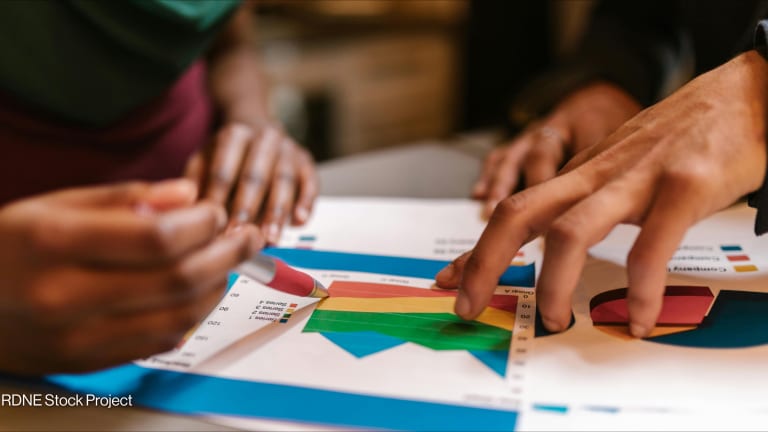What funders and fundraisers can learn from philanthropic networks
As official development assistance declines, philanthropic networks are helping funders learn, collaborate, and act. Here’s how three networks are adapting — and what their evolution means for funders and fundraisers alike.
When official development assistance shrinks and geopolitical uncertainty mounts, where do development players turn? Increasingly, to philanthropy. And behind the scenes, to philanthropic networks — the often invisible spaces where funders gather, reflect, and sometimes change. But in this high-stakes moment, can networks do more than convene? Can they actually accelerate better, bolder funding? That was the core question explored during a recent Devex Pro event featuring Laura Savage of the International Education Funders Group, Melanie Ormos of Forward Global, and Randall Kempner of the Climate Philanthropy Catalyst Coalition. The conversation offered a rare inside look at how these networks are operating — and what’s shifting under pressure. A funding landscape on edge All three speakers described a moment of real tension. Kempner said that ODA cuts, political instability, and the erosion of long-standing donor commitments — particularly in the United States — are creating a funding environment unlike anything he had seen in his lifetime. “There’s just a lot of uncertainty, a lot of fear,” he said. That pressure is showing up in different ways. Ormos described how Forward Global’s members feel “pummeled ... from every direction,” juggling a sense of urgency with the reality that no single person can fill the gaps left behind. Savage added that among education funders, uncertainty still dominates. “We’re past the chaos of January, February, but we’re not at a point of … new understandings of what philanthropy’s position should be,” she said. From learning to collaboration Each of the featured networks is structured differently, but all are moving beyond their traditional purpose of peer learning. The International Education Funders Group has around 100 members and has seen increasing demand from them to collaborate more actively — not just on pooled funding, but also on streamlining grantmaking and carrying out joint advocacy work. Forward Global, which began as a learning program for philanthropists, has grown into a 350-member community focused on action. “We do organize based on where our funder energy and appetite is,” said Ormos, pointing to climate and democracy as two recent examples. While some conversations remain “funders-only,” the network has opened more spaces to include other players — from governments to nonprofits — recognizing that funders alone won’t drive change. The Climate Philanthropy Catalyst Coalition, less than a year old, was designed with multistakeholder participation from the start. “In creating the CPCC, the idea was to bring together the key players who are involved in catalyzing climate philanthropy,” Kempner said — including funders, advisers, and networks such as Forward Global. The goal: triple U.S. climate philanthropy in five years. Quiet collaboration, slow change? So what do networks actually achieve? Much of the value, the speakers agreed, lies in what Kempner called the “spark” — the chance encounters and behind-the-scenes conversations that may eventually lead to new funds, partnerships, or shifts in practice. But relying on sparks alone isn’t enough. “We’re all too reliant upon an individual spark that might lead to something that might lead to something bigger — and then we don’t even know if it happened half the time,” Kempner said. He said there is a need for faster, more visible strategies. CPCC is testing ideas such as real-time matching sessions and simplified due diligence to speed things up. Ormos shared an example where Forward Global connected members working on water and climate adaptation, ultimately catalyzing a pooled fund with the Roddenberry Foundation. But she acknowledged that many outcomes go unreported. “Often people don’t think about that initial spark moment,” she said. Savage added that network staff themselves rarely know what collaborations their spaces have generated, but she nonetheless defended the value of the spaces themselves. “Our belief is that if we encourage and enable deep relationships, professional friendships, diversity in those relationships, an ability to step back from the day job — from the very specific niche and mandate that each philanthropic board has given to that set of organizations and staff — then we’re enabling each member to see themselves as a piece of the puzzle,” Savage said. Responding to crisis — and shaping what comes next As panelists reflected on what’s next, a common thread emerged: Networks must do more than convene — they need to help funders act with urgency and purpose. Kempner was direct: “Networks need to get their members to give more — now.” In the climate space, that might mean focusing on legal defense, state-level opportunities, or international efforts where political resistance is lower. But the key is to avoid paralysis. “Now is not a time to be reticent. Now is the time to be bold.” Savage pointed to a deeper reckoning underway, especially in education. She said that some funders, particularly in Africa, are framing this as “the opportunity to finally shift power, throw off the colonial shackles?” and move to a model where “finally education realities will no longer be driven by the priorities of the global north.” Others are still struggling to make sense of recent shocks. “Philanthropy is often looked to as a checkbook, and it is so much more than that,” she said, noting that IEFG is encouraging members to explore possible scenarios — not dictate a single path forward, but help foundations think critically about their role and voice in shaping what comes next. Ormos highlighted the range of reactions among Forward Global’s members. Some are taking “a very offensive strategy,” pushing forward boldly; others are more constrained by governance structures or political sensitivities. What matters, she said, is that funders are informed — and pushed — to act within their capacity, not freeze. Who’s in, who’s out — and what’s shifting One audience member asked how NGOs can engage with networks — or become part of them. Forward Global’s membership is limited to individual funders, but the group now includes select nonprofit and public sector voices in its annual summits and forums. IEFG maintains clearer boundaries, requiring that members be grantmakers with a majority private source of capital. But Savage noted that many organizations now straddle roles — implementing, fundraising, and regranting — and that networks constantly reassess where to draw the line. Kempner shared that CPCC’s membership spans three types: foundations, philanthropic advisers, and networks. In his network’s case, he said, he was more reticent about engaging foundations than other types of members, stressing that CPCC is for players “actively involved in trying to catalyze climate philanthropy beyond just their own grantmaking.” Practical advice Asked what advice they’d offer to funders and fundraisers trying to engage within this ecosystem, the speakers came back to clarity, humility, and action. “Resources sitting on the sidelines are lost impact,” Ormos said, encouraging funders to be bolder and more collaborative. Savage urged fund seekers to “be aware of the diversity of philanthropy,” and to offer feedback — even across power dynamics. Kempner emphasized the need for funders to consider climate’s ripple effects across sectors — from education to poverty reduction — and to ask how it might reshape their goals. Too few funders do this, he said, and it’s part of the reason climate giving remains so limited. Ultimately, all agreed: Networks can’t solve the crisis of global aid alone. But they can help ensure funders don’t try to face it alone either. Don't miss out on future briefings. Browse our events calendar for our next live conversations.
When official development assistance shrinks and geopolitical uncertainty mounts, where do development players turn? Increasingly, to philanthropy. And behind the scenes, to philanthropic networks — the often invisible spaces where funders gather, reflect, and sometimes change.
But in this high-stakes moment, can networks do more than convene? Can they actually accelerate better, bolder funding?
That was the core question explored during a recent Devex Pro event featuring Laura Savage of the International Education Funders Group, Melanie Ormos of Forward Global, and Randall Kempner of the Climate Philanthropy Catalyst Coalition. The conversation offered a rare inside look at how these networks are operating — and what’s shifting under pressure.
This story is forDevex Promembers
Unlock this story now with a 15-day free trial of Devex Pro.
With a Devex Pro subscription you'll get access to deeper analysis and exclusive insights from our reporters and analysts.
Start my free trialRequest a group subscription Printing articles to share with others is a breach of our terms and conditions and copyright policy. Please use the sharing options on the left side of the article. Devex Pro members may share up to 10 articles per month using the Pro share tool ( ).
Raquel Alcega leads the data research and analysis at Devex, providing advice to organizations on the latest funding and programmatic trends that shape the global development space. She also heads up the news business content strategy and designs internal knowledge management processes. Prior to joining Devex’s Barcelona office, she worked in business development in Washington, D.C., and as a researcher in Russia and Mexico.








